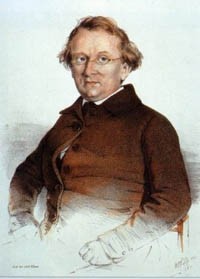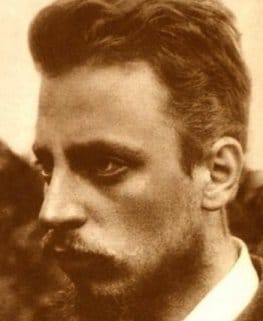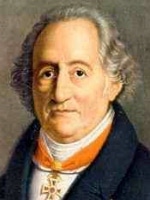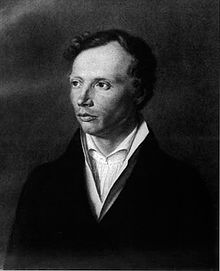
8 German Poems to Show You Deutsch Can Be Poetic and Beautiful, Too
German isn’t exactly known by most as being a beautiful language like French or Italian, though you’ll certainly find staunch defenders of the language.
Anyway, this common notion didn’t stop German poets from writing some of the most beautiful poems ever written.
That’s why I put together this post—to show you some of the German language’s most well known and well loved poems. I chose eight poems, and I also included short bios about the poets and what grammar and vocabulary points you can learn from each one.
Contents
- 1. “Er ist’s” by Eduard Mörike
- 2. “Aus Einem April” by Rilke
- 3. “Alle Vögel Sind Schon Da,” by Hoffmann von Fallersleben
- 4. “Mailied” by Goethe
- 5. “Frühlingsglaube” by Uhland
- 6. “Erlkönig” by Goethe
- 7. “An die Freude” by Schiller
- 8. “Der Panther” by Rilke
- And One More Thing...
Download: This blog post is available as a convenient and portable PDF that you can take anywhere. Click here to get a copy. (Download)
1. “Er ist’s” by Eduard Mörike
Spring lets its blue ribbon
once again flutter through the airs;
sweet, well-known scents
portentously streak the country.
Violets already dream,
want to soon come.
Listen, from far away a sweet harp!
Spring, it’s you!
I’ve heard you!
Who was Eduard Mörike?
Mörike was a German Romantic poet and prose writer who lived in the first half of the 19th century. Romantic poets loved to write works in praise of nature—a trait you can see in “Er ist’s.” Mörike is often compared to Goethe (arguably Germany’s most famous writer) and many of his works have been set to music or become folk songs after his death.
What grammar and vocabulary can I learn from this poem?
- Wollen (to want or wish): This is one of German’s six modal verbs, used to express a stronger desire to do something than möchten (to have a preference to do something).
- Durch (through or by): This common preposition always takes the Akkusativ case. See how die Lüfte (the airs) is in the Akkusativ case? It’s important to learn the cases that go with various German prepositions.
- Blaues (blue): An example of an adjective with an adjective ending—another important component of the German language/
2. “Aus Einem April” by Rilke
The forest smells again.
It raises the floating larks
which were so heavy on our shoulders, upwards into the sky;
indeed, one saw through the branches the day, how it was empty,
but after long, rainy afternoons
come the gold, sunny
newer hours,
before which the far house fronts flee
all the sore windows, fearful with wings’ attack.
Then it is still. Even the rain goes softer
over the stone’s peaceful, darkening shine.
All sounds hide away
in the shiny buds of the bushes.
Who was Rilke?
Rainer Maria Rilke was an Austrian poet and novelist who was born in Prague in the late 19th century and died in Switzerland after World War I. He’s famous for his poems, for a novel and for his correspondence. His works feature motifs from Greek mythology and are quite popular in the United States. You can read more of Rilke’s poetry here.
What grammar and vocabulary can I learn from this poem?
- Knospen (buds): This is a very important spring word! Budding plants are one of the most welcome signs of the return of spring.
- Knospen der Reiser (buds of the bushes): This is an example of the Genitiv case, the German possessive case that’s being supplanted in spoken German, but is still found in written German.
- Sah (saw): An example of the German past literary tense, a rare tense in spoken German but important to know when reading old German books.
3. “Alle Vögel Sind Schon Da,” by Hoffmann von Fallersleben
All the birds are there, all the birds, all!
What singing, music,
whistling, chirping, trilling!
Spring wants to march in now,
come with singing and sounds.
How funny is all, nimble and happy stir!
Blackbird, finch, thrush and starling
and the whole flock of birds
wish you a merry year,
sincere health and blessing.
What we say now, we take to heart:
all we want to be funny,
funny like the birds,
here and there, out, in,
jumping, dancing, joking.
What grammar and vocabulary can I learn from this song?
- Wünschen dir (wish you): Dir is in the dative case here, since the birds are saying that they wish to you healing and blessing.
- Vögel (birds, plural): Vögel is the plural of Vogel (bird). Remember this, because beginners commonly make the mistake of making Vogel plural by putting an -n on the end, which creates a word that certainly does not mean birds.
- Springen, tanzen (to sing, to dance): These are essential verbs in the German language, and important to know!
If you enjoy breaking down poems line by line to learn German, you can use a similar method for other German media, including TV shows and songs.
FluentU takes authentic videos—like music videos, movie trailers, news and inspiring talks—and turns them into personalized language learning lessons.
You can try FluentU for free for 2 weeks. Check out the website or download the iOS app or Android app.
P.S. Click here to take advantage of our current sale! (Expires at the end of this month.)
4. “Mailied” by Goethe
How brightly nature
Shines this morning!
What radiant sun!
How the fields sing!
The buds burst forth
From each green frond!
A thousand bushes
Resound with song!
And joy and wonder
Streams from each breast.
Oh Earth! Oh Sun!
Oh joy without rest!
Loveliest of loves!
Fair and golden,
Like morning clouds
On the mountain.
You renew each field
With veils of mist.
And your morning dew
Leaves each field blessed.
Oh how I cherish
You, sweetest maid!
How your eyes shine bright
Where love can’t fade.
As morning larks love
To sing and fly,
As springtime flowers
Greet the blue sky,
So do I love you
With all my heart!
The one who inspires
Youth, joy and art;
A mood for new songs,
Dancing lively.
Oh be so happy
As you love me!
Who was Goethe?
Johann Wolfgang von Goethe is probably Germany’s most famous writer (in fact, Germany’s most famous language school, the Goethe-Institut, is named after him). He was a German Romantic writer who lived in the late 18th and early 19th centuries; he wrote poems, novels and treatises. You can read one of Goethe’s most famous books here.
What grammar and vocabulary can I learn from this poem?
- Aus dem Gesträuch (out of the undergrowth): Here’s an example of aus (out), a preposition that takes the dative case in this circumstance.
- Du mich liebst (you love me): If you love somebody or something, the thing you bestow your affections on takes the accusative case in German. In fact, emotion verbs (love, hate, etc.) always take accusative.
- Leuchtet mir die Natur (nature shines on me): Mir is an example here of the dative case—it makes the difference between “nature shines me” and “nature shines on me.”
5. “Frühlingsglaube” by Uhland
The gentle breezes are awoken,
They whisper and weave day and night,
They create in all ends.
Oh fresh fragrance, oh new sound!
Now, poor heart, don’t be anxious!
Now all must change.
The world becomes prettier with every day,
One does not know, what yet will be,
The blooming doesn’t want to end.
The farthest, deepest valley blooms:
Now, poor heart, forget the agony!
Now all, all must change.
Who was Uhland?
Johann Ludwig Uhland was a poet and historian from Tübingen, in southwest Germany. He was born in the late 18th century and lived long into the 19th. He was a professor of literature who was inspired by medieval motifs in his ballads and poetry. You can find more of his work here.
What grammar and vocabulary can I learn from this poem?
- Fernste, tiefste (farthest, deepest): This is an example of German superlative adjectives.
- Die Welt wird schöner (the world becomes more beautiful): This is a use of the verb werden (to become), a word that has plenty of uses in the German language.
- Wenden (to change): This is an important verb in German. Not only does it mean “to change,” but it’s also related to the noun die Wende (the change), which refers to the reunification of Germany in 1990.
6. “Erlkönig” by Goethe
Who rides there so late through the night dark and drear?
The father it is, with his infant so dear;
He holdeth the boy tightly clasp’d in his arm,
He holdeth him safely, he keepeth him warm.
“My son, wherefore seek’st thou thy face thus to hide?”
“Look, father, the Erl-King is close by our side!
Dost see not the Erl-King, with crown and with train?”
“My son, ’tis the mist rising over the plain.”
“Oh, come, thou dear infant! oh, come, thou with me!
Full many a game I will play there with thee;
On my strand, lovely flowers their blossoms unfold,
My mother shall grace thee with garments of gold.”
“My father, my father, and dost thou not hear
The words that the Erl-King now breathes in mine ear?”
“Be calm, dearest child, ’tis thy fancy deceives;
‘Tis the sad wind that sighs through the withering leaves.”
“Wilt go, then, dear infant, wilt go with me there?
My daughters shall tend thee with sisterly care;
My daughters by night their glad festival keep,
They’ll dance thee, and rock thee, and sing thee to sleep.”
“My father, my father, and dost thou not see,
How the Erl-King his daughters has brought here for me?”
“My darling, my darling, I see it aright,
‘Tis the aged grey willows deceiving thy sight.”
“I love thee, I’m charm’d by thy beauty, dear boy!
And if thou’rt unwilling, then force I’ll employ.”
“My father, my father, he seizes me fast,
Full sorely the Erl-King has hurt me at last.”
The father now gallops, with terror half wild,
He grasps in his arms the poor shuddering child;
He reaches his courtyard with toil and with dread,
The child in his arms finds he motionless, dead.
What grammar and vocabulary can I learn from this poem?
- Not and tot: These two words, meaning “dread” and “dead” also rhyme in English, which shows you some of the common roots of Germanic languages.
- Dem Vater grauset’s, er reitet geschwind: The poem presents a range of verb forms, providing exposure to various tenses and moods in German. This line in particular also shows some archaic forms, which are better preserved in German than in English.
7. “An die Freude” by Schiller
Joy, beautiful spark of the gods,
Daughter of Elysium,
We enter, fire-drunk,
Heavenly One, your shrine.
Your magic binds again
What custom has strictly parted.
All men become brothers,
Where your gentle wing abides.
Who has succeeded in the great attempt,
To be a friend’s friend,
Whoever has won a lovely woman,
Add in his jubilation!
Indeed, who calls even one soul
His own on the earth’s sphere!
And whoever never managed it should slink
Weeping from this union!
All creatures drink of joy
At nature’s breast.
Just and unjust
Alike taste of her gift;
A tried friend to the end.
Even the worm has been granted sensuality,
And the cherub stands before God!
Gladly, as His heavenly bodies fly
On their courses through the heavens,
Thus, brothers, you should run your race,
As a hero going to conquest.
You millions, I embrace you.
This kiss is for all the world!
Brothers, above the starry canopy
There must dwell a loving Father.
Are you collapsing, millions?
Do you sense the creator, world?
Seek Him above the starry canopy!
Above stars must He dwell.
Who was Schiller?

Johann Christoph Friedrich von Schiller was a remarkable figure in German history, known as a renowned poet, philosopher and playwright. Schiller’s writings explored profound themes like freedom, the intrinsic worth of every human being and the pursuit of higher ideals. Some of his most notable creations include “William Tell,” “The Robbers,” and the renowned poem (included here) “Ode to Joy,” which was beautifully set to music by Beethoven.
What grammar and vocabulary can I learn from this poem?
- Subjunctive Mood (Konjunktiv): The poem makes use of the subjunctive mood, particularly in expressing wishes and hypothetical situations. The verb binden (to bind) is in the subjunctive mood (binden wieder instead of the indicative binden wiederbindet). This usage creates a hypothetical scenario, suggesting that the “magic” in the poem has the potential power to unite, rather than stating it as a concrete fact.
- Emotions and Feelings: The poem contains vocabulary related to emotions and feelings, such as “Freude” (joy), “Liebe” (love) and “Wonne” (bliss).
8. “Der Panther” by Rilke
His vision, from the constantly passing bars,
has grown so weary that it cannot hold
anything else. It seems to him there are
a thousand bars; and behind the bars, no world.
As he paces in cramped circles, over and over,
the movement of his powerful soft strides
is like a ritual dance around a center
in which a mighty will stands paralyzed.
Only at times, the curtain of the pupils
lifts, quietly—. An image enters in,
rushes down through the tensed, arrested muscles,
plunges into the heart and is gone again.
What grammar and vocabulary can I learn from this poem?
- Adjectives and Their Declensions: The poem features adjectives describing the panther. For example, the adjective müd (weary) is declined to match the masculine nominative singular form sein Blick (his gaze). The adjective müd takes the ending -d in this case.
- Cognates with English: Since English is a Germanic language, there are plenty of cognates, such as Panther (panther).
See, German can be a very poetic language if you know where to look. You can even learn a little about German grammar and vocabulary from them, which isn’t bad either.
Download: This blog post is available as a convenient and portable PDF that you can take anywhere. Click here to get a copy. (Download)
And One More Thing...
Want to know the key to learning German effectively?
It's using the right content and tools, like FluentU has to offer! Browse hundreds of videos, take endless quizzes and master the German language faster than you've ever imagine!
Watching a fun video, but having trouble understanding it? FluentU brings native videos within reach with interactive subtitles.
You can tap on any word to look it up instantly. Every definition has examples that have been written to help you understand how the word is used. If you see an interesting word you don't know, you can add it to a vocabulary list.
And FluentU isn't just for watching videos. It's a complete platform for learning. It's designed to effectively teach you all the vocabulary from any video. Swipe left or right to see more examples of the word you're on.
The best part is that FluentU keeps track of the vocabulary that you're learning, and gives you extra practice with difficult words. It'll even remind you when it’s time to review what you’ve learned.
Start using the FluentU website on your computer or tablet or, better yet, download the FluentU app from the iTunes or Google Play store. Click here to take advantage of our current sale! (Expires at the end of this month.)











